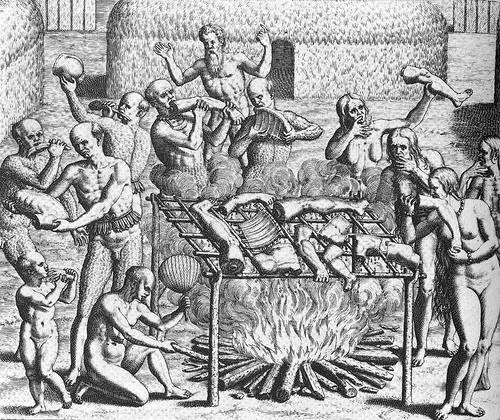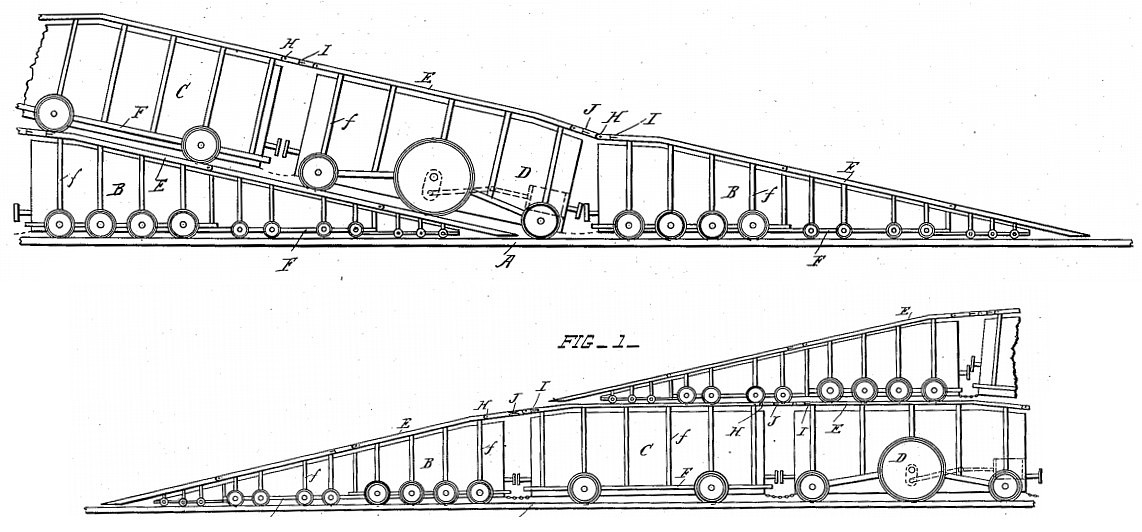MINE (English), MIEN (French), and MEIN (German) are synonyms and anagrams in three languages.
Takeout Food

Here’s a theological poser: What happens to cannibals on Judgment Day? If I eat you and assimilate your flesh, how can we both be resurrected?
“It is not possible for two men to be resurrected with the same flesh at the same time, and nor is it possible for the same limb to have two different masters,” writes Athenagoras of Athens. “How can two bodies, which have successively been in possession of the same substance, appear in their entirety, without lacking a large part of themselves? In the end, either the disputed parts will be returned to their original owners, leaving a gap in the later owners, or they shall be fixed in the latter, leaving in this case an irreparable loss in the former.”
Augustine answers, “The flesh in question shall be restored to the man in whom it first became human flesh; for it is to be considered as borrowed of the other man, and, like borrowed money, to be returned to him from whom it was taken.”
I guess we’ll find out.
Boss Mob
Senior job titles in the U.S. government, from among 49 compiled by Paul C. Light, public policy director for the Pew Charitable Trusts, for testimony before the Senate Finance Committee, Feb. 11, 1998:
- Deputy Secretary
- Deputy Administrator
- Associate Administrator
- Assistant Under Secretary
- Deputy Associate Deputy Secretary
- Principal Deputy Assistant Secretary
- Associate Deputy Assistant Secretary
- Principal Associate Deputy Secretary
- Deputy Chief of Staff to the Secretary
- Chief of Staff to the Deputy Secretary
- Chief of Staff to the Assistant Secretary
- Deputy Associate Deputy Administrator
- Chief of Staff to the Associate Administrator
- Principal Associate Deputy Under Secretary
- Associate Principal Deputy Assistant Secretary
- Chief of Staff to the Associate Assistant Secretary
- Principal Deputy to the Deputy Assistant Secretary
“At my last count in 1994, there were sixteen layers of supervisors between the President of the United States, who is the ultimate chief executive of the [IRS], and revenue agents far below. Most agents report to a district group manager who reports to a branch chief who reports to an assistant chief of their division who reports to the assistant district director who reports to the assistant regional commissioner who reports to the regional commissioner who reports to the chief of staff to a deputy assistant commissioner in Washington who reports to the deputy assistant commissioner who reports to the assistant commissioner who reports to the chief operating officer who reports to the deputy commissioner of the IRS who reports to the commissioner who reports to the Deputy Secretary of the Treasury who reports to the Secretary who finally reports to the president (assuming that the White House deputy chief of staff and chief of staff don’t get in the flow).”
In a Word

moonglade
n. the reflection of moonlight on a body of water
The Mail Plane
A motorcyclist was sent by the post office to meet a plane at the airport.
The plane landed ahead of schedule, and its mail was taken toward the post office by horse. After half an hour the horseman met the motorcyclist on the road and gave him the mail.
The motorcyclist returned to the post office 20 minutes earlier than he was expected.
How many minutes early did the plane land?
I Contain Multitudes
OPERAS is the plural of OPERA, which is the plural of OPUS.
Away From It All

If you’re looking for a challenge, see if you can reach 82°06’S 54°58’E — it’s the most inaccessible point in Antarctica, the farthest from the ocean and the coldest place in the world.
You’ll know you’ve arrived because you’ll find a bust of Lenin peering weirdly across the ice toward Moscow.
Dig down 20 feet and you’ll uncover a pair of locked doors. Get those open and you can enter an old Soviet research hut, now completely entombed in snow.
And inside the hut is a golden visitors’ book to sign.
Doubletalk
A 12th-century version of the liar paradox:
Socrates swears that he will speak only falsehoods about you.
Then he says, “You are a stone.”
This shows that a man can lie and speak the truth at the same time.
Unquote
“Where there’s a will there’s a won’t.” — Ambrose Bierce
Crashproof
This is clever — in 1895, Henry Latimer Simmons invented ramp-shaped railroad cars:

“When one train meets or overtakes another train, one train will run up the rails carried by the other train, and will run along the rails and descend onto the rails at the other end of the lower train.”
See? With good design, everybody wins.
